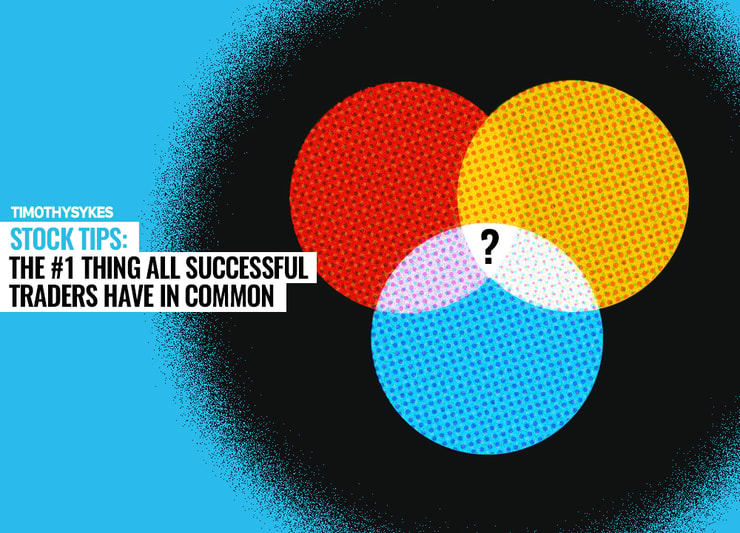Traders are often on the hunt for stock tips — anything to help them improve in the markets. I have plenty of tips for you, but first I have to clear up a common misconception about trading…
A lot of people think you have to be a super-smart math genius or have a major in economics to be a good trader. That’s just not true.
I’m not that smart — I’m not even that good at math. And neither are many of my successful students. The problem is that most traders lack discipline. They don’t prepare. Or if they do, they don’t stick to their plans.
Being a good trader means you have to accept that trading is counterintuitive. It isn’t an exact science, and it’s not like any other career. What other careers can give you the potential to make so much money with no special degree or schooling? Not many…
So let’s get into what you need to know to become a self-sufficient trader.
In this post, I give you some stock tips for beginners and lessons to help you get in the right trading mindset. Plus, learn the number one thing I think all successful traders have in common. You’ll have to read to the end for that. Let’s do this!
Table of Contents
- 1 How Do You Get Good at Trading Stocks?
- 2 Is It Possible to Trade Stocks as a Beginner?
- 3 15 Hot Stock Tips From Professional Traders for Beginners
- 3.1 #15) Keep It Simple
- 3.2 #14) Have a Trading Plan
- 3.3 #13) Keep a Trading Journal
- 3.4 #12) Follow the Rules
- 3.5 #11) Cut Losses Quickly
- 3.6 #10) Learn From Your Mistakes
- 3.7 #9) Paper Trade on StocksToTrade
- 3.8 #8) Don’t Trade With Money You Can’t Afford to Lose
- 3.9 #7) Find a Trading Mentor
- 3.10 #6) Manage Risk
- 3.11 #5) Don’t Follow Hot Stock Picks and Alerts
- 3.12 #4) Never Chase
- 3.13 #3) Study, Study, Study
- 3.14 #2) Take Profits
- 3.15 #1) Don’t Force Trades
- 4 What Are the Best Stocks to Trade as a Complete Beginner?
- 5 Conclusion: Use These Stock Tips to Start Trading Today
How Do You Get Good at Trading Stocks?
Getting good at trading is like getting good at anything. It takes knowledge, practice, and experience.
You have to go through the process just like everyone else. There are no shortcuts and no excuses.
Before you can grow your trading account, you need to grow your knowledge account. You need to study everything. There’s not one book, DVD, or video lesson that’s gonna teach you everything you need to know.
You need to study it all. The past and the present.
Join my 30-Day Bootcamp to start your education. It’s a month’s worth of lessons with daily assignments and homework. And you can work at your own pace and repeat it as many times as you like. Bonus: It comes with “The Complete Penny Stock Course” book and my “Pennystocking Framework” DVD.
If you want to be good at trading, be ready to study!
Is It Possible to Trade Stocks as a Beginner?

It’s easier than ever for new traders to enter the market and start trading. Robinhood and commission-free brokers have made trading stocks from nearly anywhere more accessible at ‘no cost.’
So pretty much anyone can trade, but that doesn’t mean they’ll be successful at it. Luckily, you don’t have to be a math wiz or even that smart to be a successful trader…
But you must have the right perspective and mindset. It’s not gonna happen overnight … but it can happen if you’re committed to doing the work. More and more of my students are showing it’s possible …
My student Tim Grittani started with only $1,500. He didn’t make any money in his first nine months. But he eventually got it, and now his gains are almost $13 million.*
Check out this video where Tim and I talk about his progress and tips for beginners.
My student Roland Wolf recently passed $1 million in trading profits.* Check out Roland’s new program, $1K Paydays. Understand you don’t need millions of dollars to have a great life, $1K a day can be life-changing.
And there’s my student Mark Croock who’s now up over $2 million in profits*. He also trades options — something I don’t do. So you can find success with whatever strategy works for you — when you put in the time and effort.
Only experience can teach you what works for you and what doesn’t. If you want to learn options, check out Mark’s Evolved Trader course.
I have so many other successful students too. Too many to list here. But they all prove that you can learn to trade stocks and grow over time.
Your success is entirely dependent on how hard you work, how dedicated you are to refining your process, how patient you are learning from your ups AND downs & basically just how bad you want to be fucken rich & successful. Learning on your own is tougher so mentoring/rules help!
— Timothy Sykes (@timothysykes) October 9, 2020
15 Hot Stock Tips From Professional Traders for Beginners
Looking for hot stock tips for beginners? Here ya go…
#15) Keep It Simple
Trading can be stressful. So don’t make it harder than it has to be. Too many newbies come into trading thinking they’ll catch every move and get rich fast. Not gonna happen.
In the beginning, you need to find one or two patterns that make sense to you. Practice and refine trading those patterns before you move on to anything else.
All of my top students started off trading only a few simple patterns.
#14) Have a Trading Plan
All the stock tips in the world add up to nothing without a trading plan. This is a must. Trading without a plan is gambling. Before you enter a trade, know what your goal is, where you’ll cut losses, and where you’ll take profits. And be ready to adapt once you’re in the trade…
If a stock’s not doing what you expected — get out. Whether it’s a small gain or a small loss, you have to accept when you’re wrong and move on.
Use the Sykes Sliding Scale to help you determine which trades have the best odds for your strategy.
#13) Keep a Trading Journal
Keeping a trading journal goes hand in hand with your trading plan. You make your trading before you take a trade. And then you record every move and detail in your trading journal.
Include as much information as you can. Then you can go back at the end of the week or month and analyze your performance. You want to know which pattern you traded, your position size, entries, exits, and if you had a gain or a loss.
It’s also smart to note the time of day, your mindset, and your emotions.
And include any mistakes, what you nailed, and anything you could’ve done better. When you review it all, you won’t remember all these little details.
This is how you can adapt your trading and create your own customized stock tips based on your results.
#12) Follow the Rules
Trading requires discipline. There’s no getting around it. You need to be in control.
I trade with these rules. You can make your own rules depending on your strategy and personality. Some of my rules might work for you and others won’t.
You can make your trading individual to you and adjust your rules as you progress and make mistakes.
But my rule #1 is always…
#11) Cut Losses Quickly
This ‘stock tip’ is my rule #1. It’s SO important. If you don’t cut your losses, you’re not trading, you’re investing. And you’re risking everything on that one trade. Because that one time you decide to hold and hope, you’re creating bad trading habits.
Trading should be robotic. There’s no room for emotion. You can’t get your feelings hurt when a trade doesn’t go your way. Losses are part of the game. The sooner you accept that, the better off you’ll be.
Get in the habit of cutting losses quickly. It’s the best way to prevent small losses from becoming major disasters.
And when you have losses…
#10) Learn From Your Mistakes
Everyone makes mistakes — it’s human nature. But what you do about your mistakes is up to you. Will you get upset, freak out, cry about it, and give up? Or will you look back at what you did and learn from it?
You might get upset about losing money or doing something dumb. But try to look at it from a learning perspective: How can you do better next time?
You have to learn from your ups and downs. Be dedicated to refining your process. Getting rich isn’t easy.
We all make mistakes. I still do. Don’t beat yourself up. Just try to improve every day.
I’m not trying to be mean/a dick, just honest & blunt AF because sadly very few people in this industry are. Its a beautiful thing to be able to make 6, 7, 8 or even 9 figures with no fancy degree, office, special talents or skills, intelligence & most of all without any manners!
— Timothy Sykes (@timothysykes) October 8, 2020
#9) Paper Trade on StocksToTrade
So many newbies want hot stock tips and to know how how to find stocks. I use StocksToTrade. And I always recommend new traders start with paper trading on StocksToTrade before using real money.
Too many newbies jump right in and start trading. And they get humbled FAST.
Paper trading is a great way to take practice trades while you study and learn. You can see the patterns in real time and try out your trading plans. And there’s no risk to your capital.
Of course, it’s not as emotional as trading real money. But it’s a good way to get a feel for watching stocks move, placing orders, and entering and exiting trades.
When you do start trading…
#8) Don’t Trade With Money You Can’t Afford to Lose
Trading and investing are risky — penny stocks especially. NEVER use the money you need to pay your bills. Don’t take out a loan or borrow money from family and friends to trade.
If you don’t have the money to trade right now, paper trade while you save up enough cash.
Trading with money that you need adds too much pressure and risk. You’ll be much more comfortable trading if it’s not your mortgage payment on the line.
You can learn so many trading basics for low or no cost. And while you’re learning…
#7) Find a Trading Mentor
When it comes to stock tips, this is key. Sure, you can struggle to figure out all the nuances of the market by yourself — but why do that? Why go it alone? That’s just dumb.
I’ve been trading penny stocks for over 20 years. I’ve already made all the mistakes in the book so you don’t have to.
I put out so many resources to help you. It’s up to you to use them. Your success comes down to you. What will you do NOW to give yourself the best chance of becoming a successful trader?
Learning from a mentor can speed up your learning curve and help you avoid costly mistakes and losses. Wanna learn the hard way? Go for it.
But the resources are there for you. It’s up to you to take advantage of the opportunity to change your life. If you’re truly dedicated, apply for my Trading Challenge.
#6) Manage Risk
An important part of trading is risk management. You need to know how much you’re willing to risk on each trade. Whether it’s the same amount each time, like 1% of your account or 1% of the money in the trade.
Or if you’re going to have a set dollar amount, like $20 or $100 per trade, depending on your account size.
Find a risk management strategy that works for you. Then stick to it.
#5) Don’t Follow Hot Stock Picks and Alerts
Learning to trade isn’t about which hot stocks to buy. It’s about learning the process and having the right mindset. Stocks come and go.
It doesn’t matter how great a stock is if you don’t know how to trade it. Following someone else’s trade alerts and hot picks won’t help you learn how to trade stocks.
That’s why my goal as a teacher is to create self-sufficient traders. My top students don’t need me to tell them which volatile later in the day than in the after-hours market. This is when traders and investors close out positions or spot stocks to buy or how to trade them. They can do that all on their own.
#4) Never Chase
Let’s say you find a hot stock … but by the time you catch it, it’s already up.
You get FOMO and buy in. But then the stock reverses and quickly drops. Hopefully, you cut your losses quickly and learn from your mistake.
But some beginners like to hold, thinking it will go back up. I can’t say this enough — never trust any of these stocks or companies. Always expect the worst.
Never chase stocks. It usually ends badly. Learn to sit on your hands and wait for a dip buy opportunity or another buy signal. Or just walk away and wait for the next play.
#3) Study, Study, Study
My student Roland Wolf was studying 15–17 hours a day when he first started. It paid off for him, as it did for all my other millionaire students who put in the work.*
Trading’s a career with no finish line. There will never be a day when you know everything. There’s no time for laziness. But at the same time, you don’t have to be super smart. You just have to be dedicated to learning the process.
The markets are always changing. You have to constantly adapt and adjust your trading with the markets.
#2) Take Profits
This might sound obvious, but it’s amazing what can happen when you’re in a trade. You can have a big winner and start to think. “Maybe this can go higher…”
Then you watch as the stock reverses and wipes out your gains. Don’t get greedy.
Sounds dumb, but it happens more than you think. Don’t be a gunslinger. Go for singles, not home runs.
Now to round out my hot stock tips for today…
#1) Don’t Force Trades
You can’t make a stock do what you want. You can’t make a certain amount per trade just because you want to. The market doesn’t care how much money you want to make or what you think.
If the ideal trade isn’t there, don’t force it.
Learn to take what the market gives you. Be patient and let trades come to you. Forcing trades leads to overtrading. Before you know it, you’ve made a bunch of trades, and all your little losses add up to a big disaster.
People come into trading too focused on the money. Forget about the money. Focus on your discipline, the process, the patterns, and executing your trading plan. If you can do all those things well, congrats. You’re on your way to becoming a self-sufficient trader.
What Are the Best Stocks to Trade as a Complete Beginner?

Penny stocks, obviously. Okay, maybe I’m biased, but seriously, I think they’re the best.
It’s important to research all the brokers before choosing one. Make sure your broker allows you to trade penny stocks and OTCs before you open an account.
OTC stocks tend to be less choppy than listed stocks. That’s why I think they’re great for beginners. They also move in patterns that repeat. So once you can recognize them, things can get easier as you go.
For complete beginners, I recommend you start with “The Complete Penny Stock Course.” My student Jamil put all my lessons together into this book — it’s a must-read!
Success in the stock market does not depend on intelligence, math skills or how physically or mentally fit you are, on the contrary many of the best traders I know are some of the dumbest, fattest, most undisciplined people you’ll ever meet…no, what matters most is PREPARATION!
— Timothy Sykes (@timothysykes) October 8, 2020
Conclusion: Use These Stock Tips to Start Trading Today
I hope you use these stock tips to improve your trading. But after all these stock tips, what’s the #1 thing all successful traders have in common?
Preparation.
There’s no shortcut around it. Once my top students started finding success, they all said it was because preparation met opportunity. You can’t take advantage of opportunities if you’re not prepared.
If you want to be my next millionaire Trading Challenge student, you need preparation, dedication, patience, and the right mindset.
It’s up to you … How much work do you want to put in? How badly do you want it?
If you’re unprepared you’ll be like most traders who fail. Most people lack preparation — that’s what it comes down to. And that’s what I teach in my Trading Challenge.
What stock tips would you give to new traders? Let me know in the comments … I’d love to hear from you!







Leave a reply